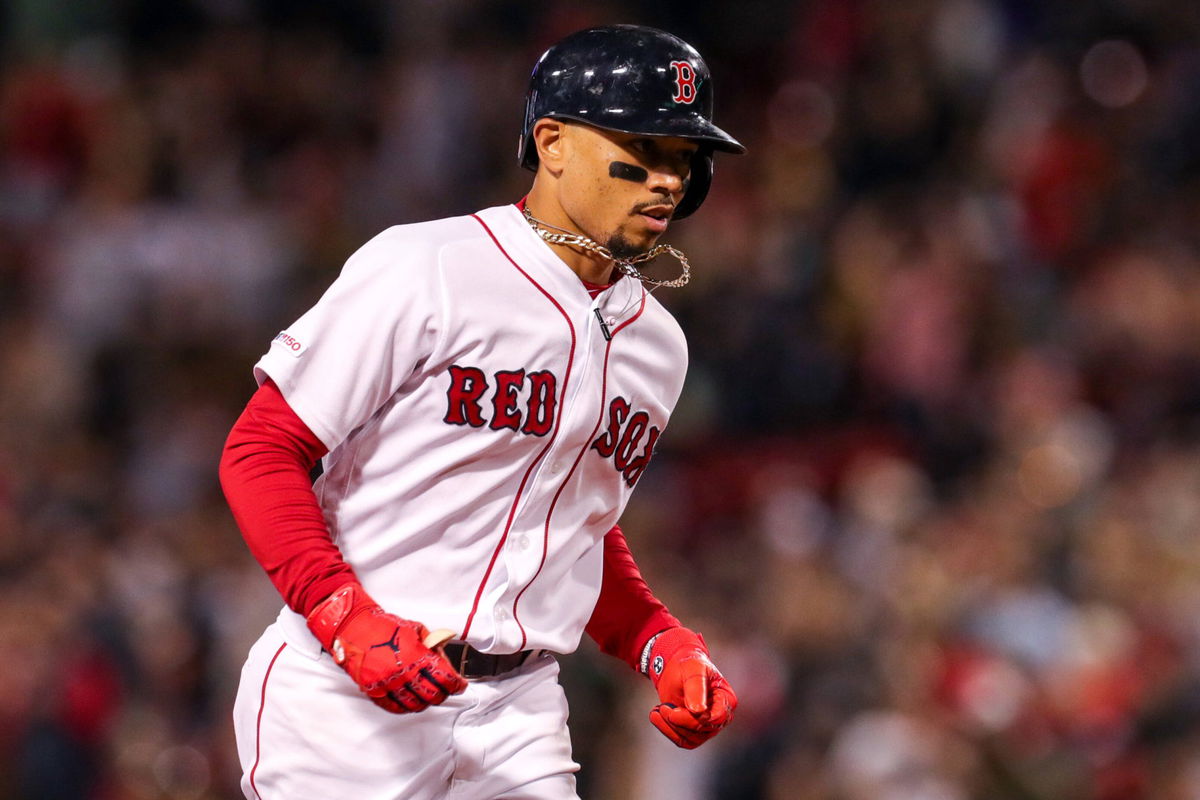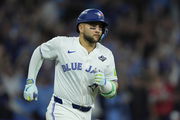
USA Today via Reuters
MLB, Baseball Herren, USA Minnesota Twins at Boston Red Sox, Sep 5, 2019 Boston, MA, USA Boston Red Sox right fielder Mookie Betts 50 reacts after hitting a home run during the fourth inning against the Minnesota Twins at Fenway Park. Mandatory Credit: Paul Rutherford-USA TODAY Sports, 05.09.2019 20:03:47, 13311856, MLB, NPStrans, Mookie Betts, Boston Red Sox, Minnesota Twins, Fenway Park, TopPic PUBLICATIONxINxGERxSUIxAUTxONLY Copyright: xPaulxRutherfordx 13311856

USA Today via Reuters
MLB, Baseball Herren, USA Minnesota Twins at Boston Red Sox, Sep 5, 2019 Boston, MA, USA Boston Red Sox right fielder Mookie Betts 50 reacts after hitting a home run during the fourth inning against the Minnesota Twins at Fenway Park. Mandatory Credit: Paul Rutherford-USA TODAY Sports, 05.09.2019 20:03:47, 13311856, MLB, NPStrans, Mookie Betts, Boston Red Sox, Minnesota Twins, Fenway Park, TopPic PUBLICATIONxINxGERxSUIxAUTxONLY Copyright: xPaulxRutherfordx 13311856
The Boston Red Sox are entering a critical offseason, vowing to make aggressive moves to restore their relevance. Yet, the shadow of one franchise-defining misstep—the trade of Mookie Betts—continues to loom large, threatening to undermine trust in their vision. Four years after dealing Betts to the Dodgers, the perception of organizational incompetence remains a millstone, coloring every decision and raising the stakes for new leadership.
Watch What’s Trending Now!
In February 2020, the Red Sox sent Betts, arguably the most complete player in baseball, and David Price to Los Angeles in a salary-shedding deal that still draws ire. The return—Alex Verdugo, Jeter Downs, and Connor Wong—was underwhelming, especially given Betts’ subsequent dominance. He helped the Dodgers win a World Series that year and has remained an MVP-caliber player, cementing the trade as a cautionary tale of shortsightedness and financial priorities trumping competitiveness. For Red Sox fans, it became emblematic of an ownership group more interested in balancing the books than building dynasties.
ADVERTISEMENT
Will this old wound heal in 2025?
Buster Olney recently posted on X, “Boston is aggressive with dollars now, but the Red Sox will have to pay extra to overcome a negative player perception that really started growing when the team wouldn’t pay Mookie Betts.”
One market factor that shifts cyclically is how some teams become a preferred destination for players, while other teams lose ground in the perception game. Boston is aggressive with dollars now, but the Red Sox will have to pay extra to overcome a negative player perception that…
— Buster Olney (@Buster_ESPN) November 27, 2024
This winter, the pressure to remove the stigma has been at its highest ever. The new Chief Baseball Officer, Craig Breslow, has the responsibility of rebuilding a team that does not have an ace pitcher, a reliable bullpen, and the stars that are synonymous with the Boston team. Some of the names that speculations suggested include Corbin Burnes, Blake Snell, and Juan Soto, but the fan base is slowly losing patience. Many fear this will be another offseason of unfulfilled promises, echoing last year’s puzzling decision to invest in Masataka Yoshida while neglecting an abysmal pitching staff.
ADVERTISEMENT
The lingering mistrust stemming from the Betts trade adds a unique urgency. Each move this offseason will be scrutinized against the backdrop of 2020. The question isn’t just whether Breslow can build a competitive roster—it’s whether ownership will finally demonstrate the ambition fans demand. For Breslow, the Betts saga serves as both a cautionary tale and a rallying cry. The Red Sox must prove that they’ve learned from their past mistakes by committing fully to high-impact signings and trades. Anything less than transformative offseason risks leaving the organization adrift in the unforgiving AL East, where rivals like the Yankees and Rays have shown no such hesitations.
Top Stories
Kyle Tucker Hit With Blunt Reality Check as Blue Jays’ Next Offseason Move Revealed, Per Insider

Ross Atkins to Part Ways With 4 Players as Blue Jays Chase 25-Year-Old Nationals Star: MLB Trade Rumor

Bo Bichette Hit With Blunt Reality Check As Red Sox Reportedly Exit Trade Talks Paving Way For Blue Jays Reunion

Hal Steinbrenner Warned Against His Tenure’s Biggest Embarrassment as Mets Near End of 1B Woes

Bo Bichette’s Toronto Return Fades Fast as Blue Jays–Red Sox Face Fierce Threat From AL East Rival: MLB Rumor

Betts is long gone, but his absence continues to shape the Red Sox’s identity. This winter may determine whether they finally move forward—or remain trapped in the shadow of their self-inflicted wound.
ADVERTISEMENT
The missing ace: a gap to fill in Boston
The Red Sox had to go through a process of rebuilding a rotation that turned into one of the team’s biggest liabilities. Since Chris Sale’s injuries and subsequent drop in performance, the Red Sox have not had an ace whom they could rely on at the back. Such a gap has affected the bullpen as it has been overworked and made the team unable to compete in the AL East. Thus, it is impossible to speak about the team’s relevance even with an upgraded lineup without solving this problem.
Signing a frontline starter such as Corbin Burnes or making a bold move for international phenom Roki Sasaki would not just address the immediate need but also signal the Red Sox’s intent to contend seriously. Pitching drives October success, as evidenced by teams like the Rangers and Diamondbacks in 2023, whose deep rotations carried them to the World Series. If Boston fails to secure top-tier arms this offseason, their chances of escaping the middle of the AL East standings will remain slim. A competitive rotation isn’t just a necessity—it’s the foundation on which the Red Sox must rebuild their identity.
ADVERTISEMENT
In essence, this isn’t about enhancing the lineup—it’s about reshaping the team’s image and demonstrating that the Red Sox are committed to reclaiming their status among baseball teams. Playing it safe is no longer an option for Boston; decisive action is the only path forward. What’s your take on this? Let us know below.
ADVERTISEMENT
ADVERTISEMENT
ADVERTISEMENT

